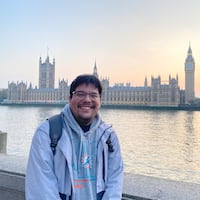Young Thug’s attorney Brian Steel learned he will not have to spend Father’s Day behind bars after the Georgia Supreme Court granted his emergency motion for bond.
In an order issued Wednesday afternoon, the court stayed Steel’s 20-day jail sentence pending the resolution of his appeal of Judge Ural Glanville’s ruling holding him in criminal contempt. Ashleigh Merchant, an attorney for Steel, said she was glad Steel doesn’t have to report to jail by 7 p.m. Friday, as Glanville had ordered on Monday.
“We are thrilled that Brian will be home with his family for Father’s Day this weekend,” she said. “We appreciate how quickly and thoughtfully our appellate courts handled this unfortunate situation.”
Steel was held in contempt after he refused to disclose who told him about a private meeting between Glanville, Fulton County prosecutors and Kenneth Copeland, a witness in the ongoing gang and racketeering trial against Young Thug and his alleged associates. Copeland’s then-attorney, Kayla Bumpus, was also at the closed-door meeting on Monday morning, court filings show.
On Monday afternoon, Glanville ordered Steel to spend the next 10 weekends in jail, angering many Atlanta attorneys who felt the sentence was unjustified. Steel, who had asked to serve his sentence alongside his client in the Cobb County Jail, appealed Glanville’s ruling and requested that his sentence be halted.
The state Supreme Court’s decision came after Glanville was asked Wednesday to recuse from the trial in response to Monday’s closed-door meeting.
Defense attorney Doug Weinstein, who represents Deamonte Kendrick, sought Glanville’s recusal and for the trial to be halted so another judge could decide if Glanville should step aside. Weinstein claimed that Glanville had intimidated Copeland during the meeting in an effort to force Copeland’s testimony.
“Aren’t you interested in removing the cloud that is hanging over the case right now?” Weinstein asked Glanville in court.
Glanville immediately denied the recusal request.
“I’d be real careful about what you’re pleading at this point in time and what you’re stating to the court,” he told Weinstein. “I would be very careful if I were you.”
Credit: Miguel Martinez
Credit: Miguel Martinez
Weinstein told the judge that his denial of the recusal request was an error.
The written request shed light on what defense counsel believe happened in the judge’s chambers Monday while they were unaware that the meeting was taking place.
Copeland allegedly said he would rather spend two years in custody than testify as the state’s witness. He had been jailed over the weekend after refusing to testify on Friday.
Credit: Miguel Martinez
Credit: Miguel Martinez
Weinstein said he believed that Glanville warned Copeland on Monday that he could remain in custody until the prosecution of more than two dozen defendants in the case had ended. Some defendants have had their cases severed from the current trial, involving six defendants, which is expected to continue into 2025.
The “coercive actions” by Glanville and prosecutors in the meeting led to Copeland’s cooperation, Weinstein alleged. He said Copeland was also warned about lying on the witness stand.
Copeland had stated in the meeting that he would admit under oath that he had killed Donovan Thomas Jr., one of the murder victims in the indictment, Weinstein alleged. The state had previously granted immunity to Copeland in exchange for his testimony.
“The only logical conclusion to be drawn by the willful exclusion of all defense counsel from the meeting ... was to harass and intimidate the sworn witness into testifying,” Weinstein’s recusal motion states.
After Copeland testified on Monday and agreed to continue cooperating as a witness, he was released from custody. His testimony is expected to take several days.
Many lawyers not involved in the trial have echoed Steel’s concerns about Monday’s meeting, saying Glanville should have included defense counsel in the discussion or at least given them the transcript. Georgia’s court rules generally prohibit “ex parte” communication on substantive matters in which a party to the case is left out.
Keep Reading
The Latest
Featured




